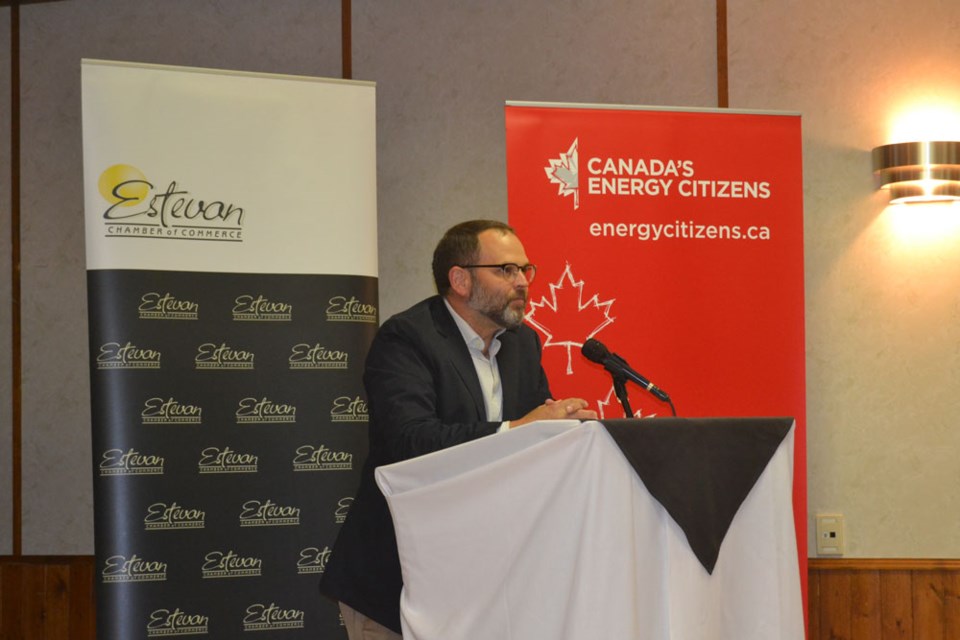Steve Rennick, manager of campaigns with the Canadian Association of Petroleum Producers (CAPP) believes that Canada’s oil and gas industries get a bad rap. Rennick is touring Canadian cities in a number of provinces from coast to coast, to raise awareness of the benefits the industry provides in Canada.
Rennick made a case for the oil and gas industry to guests at an event held by CAPP and the Estevan Chamber of Commerce, on Aug. 16 at the Days Inn, over appetizers and drinks.
Rennick gave an initial talk on state of the oil and gas industries, leading into a talk about Canada’s Energy Citizens (CEC) program, a campaign to raise awareness and garner support for the oil and gas industry in Canada.
Rennick stated that the oil and gas industry provides over 500,000 Canadians with work, creates $18 billion in public revenue, and said the economic slowdown has had a significant and negative impact, with 100,000 direct and indirect jobs in the oil and gas sector being affected. He added there has been a drop of $60 billion in industry revenues and a loss of $50 billion in industry capital investment.
“That’s the equivalent of wiping out all the revenues from the forestry, aerospace and mining industries combined, for context,” said Rennick.
Rennick stated that low oil prices combined with a lack of pipeline infrastructure available to get oil and gas to foreign markets has led to an over-reliance on the U.S., which produces more oil of its own, and buys Canadian oil at a discount.
More than half the oil (about 70,000 barrels) used and refined in Eastern Canada is imported from countries like Saudi Arabia, Algeria, Angola and Nigeria, said Rennick. Those countries have far fewer environmental policies in place than Canada.
“It’s kind of ironic, because Canada has the third-largest reserve of oil in the world,” said Rennick “There’s a solution to this. This little $15 billion infrastructure project called the Energy East pipeline. We will be able to provide Canadian oil to Eastern Canada, create refining jobs and export oil to Europe, not just the U.S., so we’ll get more direct access to markets and at higher prices.”
Rennick also promoted the Kinder Morgan expansion project and the Northern Gateway pipeline project, stating they will also open new markets for Canadian oil in Asian countries.
When he introduced the CEC program, Rennick said it is a way for Canadian citizens to make pipeline projects go through, with organized, vocal support of the industry.
The CEC enables support of the oil and gas industry, by providing people with facts to create a balanced debate between proponents and opponents of the industry.
“One of the things our research actually showed us is that 40 per cent of Canadians support the oil and gas industry,” said Rennick. “That’s almost double those people who might dub themselves active opponents of the industry.”
One of the biggest challenges the oil and gas industry faces, Rennick noted, is that its opponents are vocal— three times as likely to speak out as those who support it .
Rennick said he is certain there are many Canadians who are passionate in their support of the industry, noting that some of that passion is most evident in Saskatchewan, one of the fastest growing provinces, in terms of its proportion of CEC members.
“Saskatchewan is number 2 behind Alberta for the largest concentration of Canadian energy citizens,” said Rennick. “There are now literally CECs in every province and territory in Canada. Canadians are hungry for the ability to advocate and support the oil and gas industry.”
“It’s translating into some real-world action we’re managing to accomplish,” said Rennick. “Energy citizens are signing letters, petitions and pledges in support of oil and gas developed the Canadian way. They sent 30,000 emails to politicians and other decision makers, from the northern interior of B.C. to downtown Toronto.”
Rennick also referenced the popularity of the CEC program’s Facebook page, which jumped from 7,000 likes to 125,000 likes.
Souris-Moose Mountain MP Robert Kitchen was in attendance at the event, and stated that it was good to see the program’s growing popularity. He said the objectives and values the CEC program represent are relevant to his riding, and that there needs to be better promotion of the oil and gas industry.
“What we see is a lack of understanding in the rest of the country, of how important the oil and gas industry is to the Canadian economy. It plays a big part in their everyday lives,” said Kitchen.
Kitchen said many people in provinces such as Ontario and Quebec are unaware of how much foreign oil they utilize.
“We need to tell them, and having organizations like this that are telling them is good to see,” said Kitchen. “It’s good to get positive responses and comments, not only from Prairie provinces, but B.C. and eastern provinces, too.”



